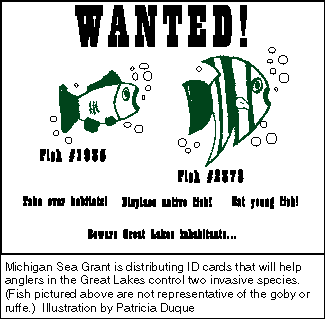The University Record, June 10, 1998
Exotic fish ID cards available for Great Lakes anglers
By Peggy Britt
Michigan Sea Grant Program
 With the start of a new fishing season, Michigan Sea Grant is stepping up efforts to distribute two wallet-sized cards to aid anglers in identifying two exotic fish found in the Great Lakes–the round goby and the Eurasian ruffe.
With the start of a new fishing season, Michigan Sea Grant is stepping up efforts to distribute two wallet-sized cards to aid anglers in identifying two exotic fish found in the Great Lakes–the round goby and the Eurasian ruffe.
The free cards describe why these fish are considered a problem, explain how to identify them and describe what anglers should do if they find them. The water-resistant cards were designed with anglers in mind, and are small enough to fit in a tackle box, wallet or pocket.
“The first line of defense has always been the sport angler,” says U-M researcher David Jude. “They’re usually the first ones to find exotic species.”
Reports from anglers will help researchers track the spread of the ruffe and goby and develop strategies for control. “We are particularly interested in new sightings of the ruffe,” says Michigan Sea Grant’s Mike Klepinger. “As of last summer they were found only in the west end of Lake Superior and in Thunder Bay at Alpena. We suspect they may be spreading quickly throughout the lower Great Lakes.”
The goby, on the other hand, is more widespread than the ruffe and is becoming a nuisance to anglers because it feeds readily on most baits. The aggressive goby can displace native fish, eat their eggs and young, and take over optimal habitat.
Anyone who catches a round goby or a ruffe should not throw it back alive. Anglers should kill the fish by freezing and, if they are in a location of concern indicated on the card, contact Klepinger at Michigan Sea Grant, (517) 353-5508; or contact the Michigan Department of Natural Resources, Michigan Department of Environmental Quality, or the U.S. Fish and Wildlife Service.
More than 280,000 cards were produced jointly with 16 state and federal agencies around the Great Lakes and Lake Champlain. Customized versions were printed for Michigan, Ohio, New York, Illinois, Indiana, Minnesota, Wisconsin, Vermont and Ontario. Because regulations vary, each contains a slightly different message regarding possession or transport of these exotic fish. Cards will be distributed through bait shops, marinas, associations, environmental education organizations, natural resource management offices and at public events.
Single cards are free. Individuals or organizations wishing to obtain a bulk order should contact Michigan Sea Grant at 764-1118 or send e-mail to [email protected].
Michigan Sea Grant, a cooperative program of the U-M and Michigan State University, is one of 30 Sea Grant programs nationwide that conduct research, education and outreach to promote greater knowledge and stewardship of the Great Lakes and ocean resources. Michigan Sea Grant is funded by the National Sea Grant College Program, a part of the National Oceanic and Atmospheric Administration.

